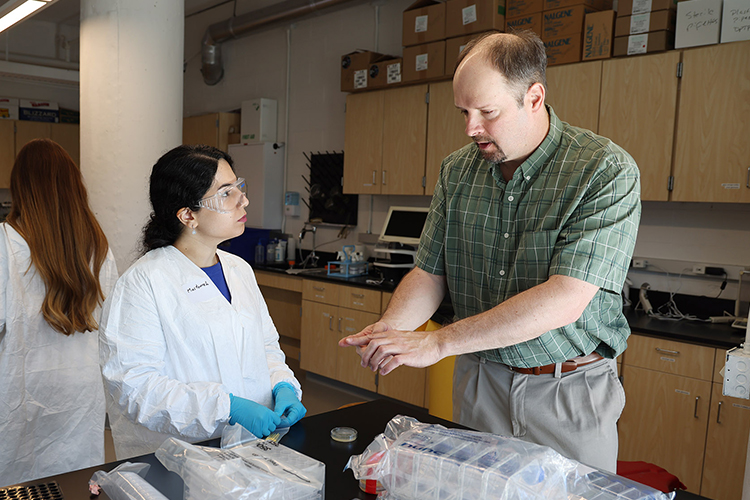RI-INBRE collaborative continues to help CCRI students, faculty meet research goals
 CCRI Biotechnology Program Coordinator Scott Warila, right, teaches a Cell and Tissue Culture Training course as part of the RI-INBRE Workforce Development and Training Program.
CCRI Biotechnology Program Coordinator Scott Warila, right, teaches a Cell and Tissue Culture Training course as part of the RI-INBRE Workforce Development and Training Program.
07/16/2024
Thanks to a $21 million National Institutes of Health (NIH) grant to continue funding Rhode Island’s premier biomedical research collaborative, the Community College of Rhode Island remains part of an exclusive network of colleges working to develop the next generation of biotechnology experts.
Since 2019, CCRI has been part of the Rhode Island IDeA Networks of Biomedical Research Excellence, or RI-INBRE, a federally-funded network of nine partner institutions that has helped increase the number of students being trained for careers in the biomedical sciences – including research in cancer, neuroscience, and environmental health sciences – by providing free access to facilities, equipment, and a network of mentors and industry professionals. In May, U.S. Senators Jack Reed and Sheldon Whitehouse and Congressmen Seth Magaziner and Gabe Amo announced a $21,004,945 federal grant deployed over the next five years to boost research capacity, acquire new equipment, expand workforce development training programs, and assist in recruitment.
This collaborative – which was established in 2001 and also includes Brown, Bryant, Providence College, Rhode Island College, Roger Williams, Johnson & Wales, and Salve Regina – allows CCRI students interested in participating in research projects to utilize facilities at colleges within the network, including URI’s state-of-the-art Centralized Research Core Facility (CRCF) at its College of Pharmacy, and work with experts in the field as part of the Summer Undergraduate Research Fellowship (SURF) program, all of which is funded through the grant.
The partnership benefits faculty, too; grant opportunities are available for curriculum development, and over the years, CCRI faculty, including Biotechnology Program Coordinator Scott Warila, Engineering professor Basile Panoutsopoulos, Biology professor Bruno Soffientino, and Chemistry professors Wayne Suits and Christopher Zoto, have applied what they've learned through the RI-INBRE collaborative in their own classrooms.
With more than $81 million in previous grants since 2001, RI-INBRE has supported over 650 research and training projects involving more than 230 different faculty members across the state while approximately 2,225 undergraduate and graduate students have received hands-on biomedical research training, continually providing the state with a pipeline of biomedically-trained personnel. According to URI, over 70 percent of undergraduates trained through RI-INBRE hold biomedical jobs in New England.
At CCRI, the RI-INBRE partnership has helped better prepare students to transfer to a four-year college, according to CCRI Biology Department Chair Christine Turenius-Bell. “We’ve seen an increase in student engagement and more students going to URI, Brown, PC, and RIC. When they leave here, they will have better networking and technical skills, and they will have the confidence to walk onto those campuses and say, ‘I know some of the faculty and students already.’"
CCRI students – particularly those from underrepresented backgrounds – have benefited from the RI-INBRE SURF program, a 10-week paid summer research experience for undergraduate students to complete research at the URI, Brown, and its Rhode Island partner institutions. Students are paired with mentors who provide guidance and support, and they can earn up to $5,600 during the program. The opportunity to participate in such a sought-after research collaborative is also a major selling point for CCRI, and as the only two-year associate degree-granting institution in the RI-INBRE circle, it dispels the notion that community colleges don’t offer the same research opportunities as four-year schools.
“You don’t often think of community colleges having a research component,” said Barbara Nauman, CCRI’s Interim Vice President of Academic Affairs and former Dean of Business, Science, Technology and Mathematics (BSTM). “URI and Brown like it because our students get a chance to look at what they have and decide to go there as well. They foster the relationship. Some of these students could literally earn more money during the summer, but they are here and they are engaged and dedicated to the program.”
CCRI students who transfer to URI can also participate in the Semester Undergraduate Research Experience (SURE) program, which provides paid research and professional development opportunities for students underrepresented in the biomedical sciences.
One of the newest components to RI-INBRE added in 2023 is the free Workforce Development and Training Program (WDT), funded by the Rhode Island Department of Labor and Training (RI-DLT) and designed to provide hands-on biomedical training and that will make them preferred new hires for the Rhode Island biomedical and biotechnology industry once they graduate and pursue biotechnology jobs.
All training modules are taught at URI, except for the newly-added Cell and Tissue Culture Training module, which Warila is teaching this summer at CCRI after recommending the addition of the course following last year’s WDT pilot cohort. Warila taught two one-week modules at the end of June that included students from CCRI, URI, and other partner institutions. Students studied cultures, observed the growth of cells and tissue formation, performed mammalian cell culture, and calculated cell density and viability of the cultures.
“The training modules went very well, and the students maintained a digital laboratory notebook of the work and was theirs to keep upon completion of the module,” Warila said. “I have always encouraged students to apply for the RI-SURF or research fellowship positions each year as it affords them the opportunity to obtain actual research experience that could make a difference in the world.
“To witness the growth they obtain from the fellowship is always amazing to see as they are able to present complex scientific research data and conclusions in an accurate and professional manner, which many of them would never thought they would have been able to a few months earlier. I’m looking forward to teaching these modules again next year and continuing the productive relationship with RI-INBRE.”



